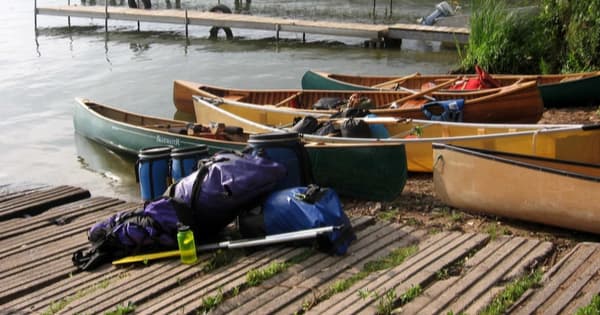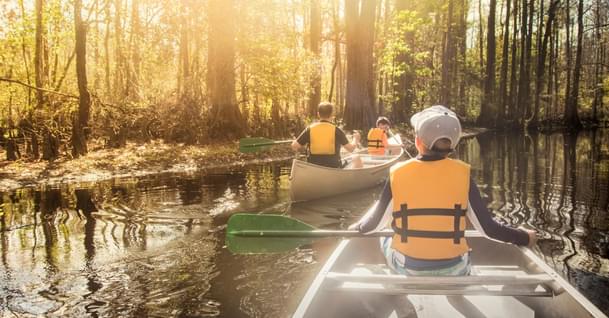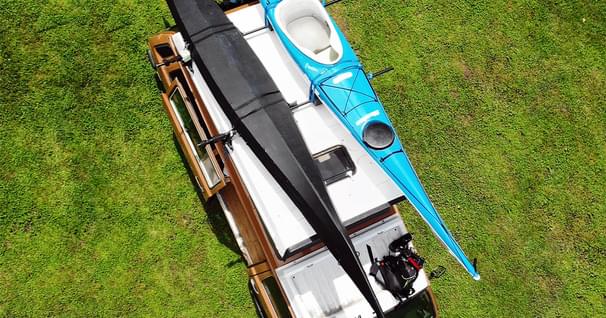Plan for the Unplanned: Canoe Trip Essentials Beyond the Basics
10 Canoe Trip Essentials Beyond the Basics
You may recall Abraham Maslow ‘s hierarchy of needs from ninth grade social studies. Maslow says, you must have your basic needs (food, water, shelter, security) taken care of in order to be able to fulfil higher order needs like developing relationships, feeling accomplished and developing your creativity. Maslow’s theory holds up on a canoe trip… You need to be fed and somewhat comfortable in order to enjoy the real goals of your trip. For me, that’s making connections with the people I'm with and the places I am visiting, and developing my wilderness craft.

There are the obvious essentials: food, shelter, fire, and water. These are the things that make or break your trip. Take time and care thinking about each of these things. Bring food that is familiar, tastes good and is easy to prepare. Make sure your tent is bug and waterproof (or bring an extra tarp to put over it). Bring a few lighters and matches and pack them in various places. Invest in a good water filter, like the MSR Miniworks. I have used mine for over ten years and it is fully field maintainable. Diligent planning will ensure you have your basic needs covered.
Sometimes things don’t go as planned. Sometimes you forget things, things break or you’re out longer than you anticipated. Sometimes the weather is different than you expected. Sometimes someone gets hurt or lost. With the ten essentials below, some resourcefulness and creativity, there’s a good chance you can ensure your basic needs are covered even when the unexpected happens.
The ten essentials:
- Fire Kit – Flint, steel and fire-starter. For fire-starter, I often bring wax cubes, Wolf Grizzly spark fibre, a Bic lighter and waterproof matches.
- First Aid Kit – What is in your first aid kit will depend on your trip, preferences and medical knowledge. Every kit should have tweezers, safety pins, reflective emergency blanket and a Field Guide of Wilderness and Rescue Medicine published by Wilderness Medical Associates.
- Compass and Whistle – Assuming you know how to use it, this may come in handy if you need to get to civilization on an unintended route. Most compasses also have a small magnifying glass that is great for cooking ants (which taste better cooked).
- Zip Ties - Zip ties are good for a lot of things. I once had a canoe go over a waterfall, thankfully with no one in it. I was able to reattach the gunwale using only zip ties and paddled it down the river for four more days. Bring a few different sizes, bigger is not always better.
- Steel Wire – I take a few yards of 16 Gauge stainless steel wire. Wire can be heated and easily pierce plastic. It is a strong thread to sew with, and has a million other uses.
- Duct Tape – Buy the good stuff. SOL makes high quality tape in mini-rolls for easy packing.
- Gear Aid Tenacious Tape – This stuff is great and allows you to repair your soft gear (tents, tarps, jackets) permanently in the field, so you don’t ruin them with duct tape goop.
- Multi-Tool - I like the Leatherman Wave. Your tool should have: needle-nose pliers with side-cutters, a can opener, screwdrivers and scissors. Having a high quality, compact multi-tool saves you from carrying a tool kit. Have a look at your gear and make sure your multi-tool has the right screwdrivers and other tools you may need.
- Extra rope – ¼ inch is nice. It’s strong enough to hang a tarp, but soft and stretchy enough for lashing.
- Extra food – Bring one decent meal that will feed your entire group. It can be an amazing morale booster to replace burnt food or when you have an unexpected delay due to weather or other mishaps. I usually take mac and cheese and some beef jerky – light to pack, heavy in the pot.
One of the amazing things about canoe tripping is that you can travel to remote wilderness destinations and you don’t have to carry everything on your back. Once you have your basic human comforts covered, plan for the unplanned; bring a few extras to ensure minor mishaps don’t ruin your trip.
Inspired by wanderlust and a passion for rivers, Adrian's paddling addiction has taken him across the globe. After pursuing his degree in Outdoor Recreation and Tourism Management, Adrian eventually settled in Palmer Rapids, Ontario. Here, he has worked for over a decade as the Director Of Operations at The Boundless School.
Related Articles
Before I was domesticated, I spent more than a decade working paddling gigs between paddling trips.…
With good technique and a little practice, regardless of size or strength, most people can perform a…
As paddlers, we depend on pristine natural environments to enjoy our sport, and many paddlers fancy…
After lots of research, maybe some classes, maybe some demo days, or maybe after finding the right sale…



